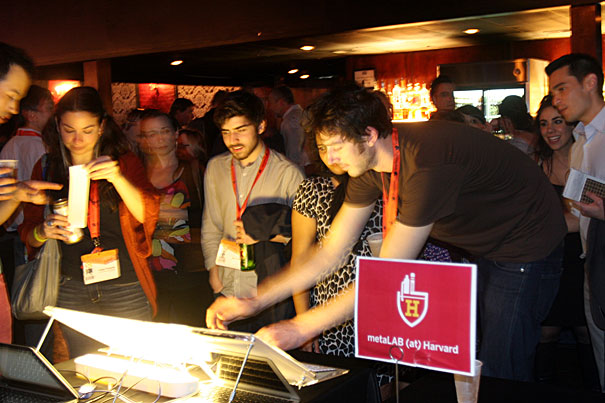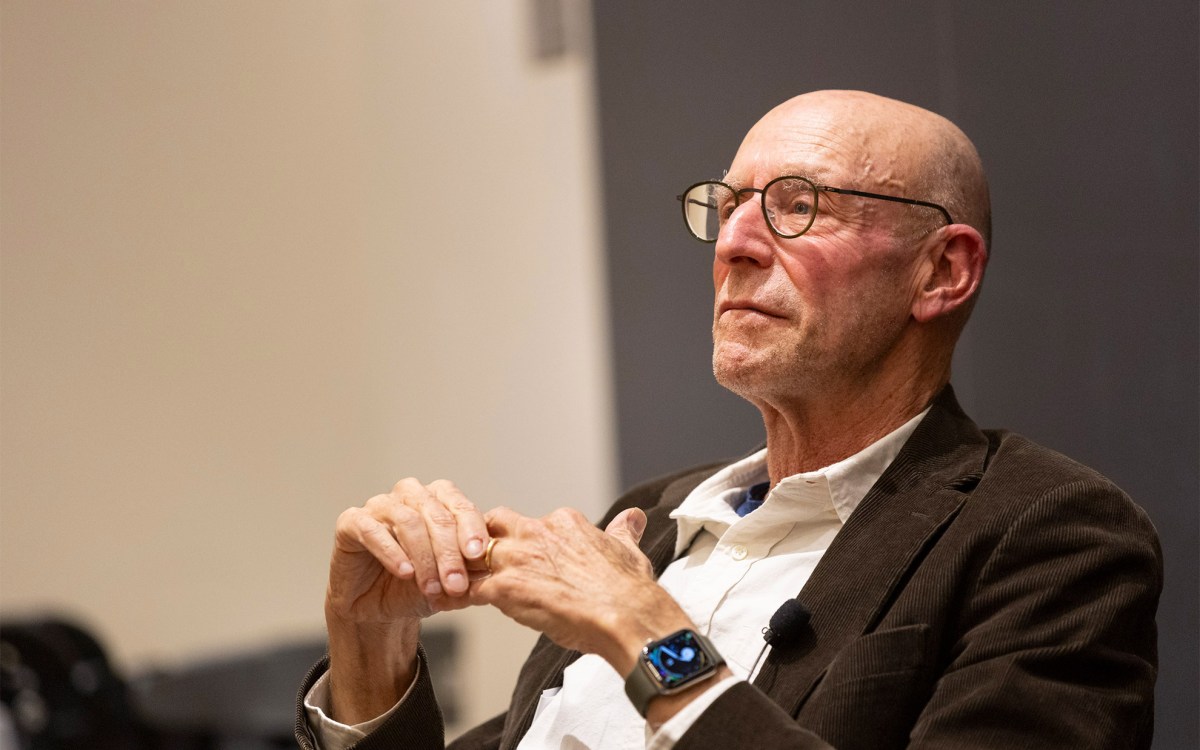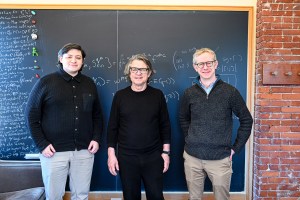
Attendees at “Digital Harvard in Austin” line up to play a Twitter-based social game created by the metaLAB (at) Harvard.
HPAC
Harvard heads Southwest
Clan gathers to explore technology at Austin digital festival
The nation’s first institution of higher learning added another first to its list this week, showcasing its digital initiatives and innovation rock stars at the South by Southwest Interactive festival (SXSW) in Austin, Texas.
More than 300 alumni, students, and guests gathered Sunday at Austin’s Parish Underground for “Digital Harvard in Austin, A 375th Anniversary Event,” a first-of-its-kind gathering sponsored by Alumni Affairs & Development.
“Today’s Harvard may not be the same Harvard you remember,” Chief Digital Officer Perry Hewitt told the crowd, which stood amid iPads primed for a Twitter-based social networking game and a gestural interface-driven LED jukebox that allowed users to remix Marshall McLuhan’s phrase “The medium is the message” by moving their hands in front of a screen.
“Today’s Harvard includes a range of digital initiatives, from pure entrepreneurship to deep digital scholarship that help us understand the world around us,” Hewitt said.
Although Harvard affiliates have attended and presented at SXSW for years, this was the first time that the University had a formal presence at the event, which brings together some of the biggest names in the technology world, and has a history of helping launch startups into the global spotlight. The move comes as the University has ramped up its own fostering of digital projects and entrepreneurs, from last year’s establishment of the metaLAB (at) Harvard, a cross-University center for investigating new forms of digital scholarship, to the more recent founding of the Harvard Innovation Lab, which fosters team-based and entrepreneurial activities and deepens interactions among Harvard students, faculty, entrepreneurs, and members of the Greater Boston community.
As attendees balanced iPhones and Boston cream doughnuts, Harvard faculty and students showcased their digital activities. Jeffrey Schnapp, professor of Romance languages and literatures, and faculty director of metaLAB (at) Harvard, spoke about the ways in which Harvard and the Greater Boston community create cross-disciplinary opportunities for innovators to come together. And Radcliffe Fellow Kara Oehler showcased Zeega, a Harvard Library Lab-funded system that she co-founded and that facilitates the creation of participatory documentaries.
Harvard student projects were also on display in a digital science fair. One project, Kindify, creates a social network that seeks to promote a chain reaction of good deeds by encouraging users to “pay it forward.” Created by two Harvard undergraduates, the site awards “reputation points” to users who do good deeds, which can then be redeemed for rewards, such as coffee or trips.
Another project, Pollvaultr, enables companies and organizations to survey people by using iPads, allowing them to gather more data than email-based surveys or URLs printed on customer receipts. Data can then be downloaded to create spreadsheets and graphs. Representatives from the Berkman Center for Internet & Society, Harvard College, and Startup Tribe, a Harvard Business School-based, University-wide network of entrepreneurs, were on hand to demonstrate apps and exchange ideas with alumni.
At SXSW Interactive, Harvard alumni, faculty, students, and staff made presentations on a variety of topics. Jonathan Zittrain, professor of law and computer science and faculty co-director of the Berkman Center, spoke on a panel titled “Help! I Have an Internet Stalker or Blackmailer!,” which reviewed norms of conduct, while Peter Coles, assistant professor of business administration at Harvard Business School, appeared on a panel about “X of Y: How to Ensure Your Start-up Is Defensible.”
“Harvard has 375 years of experience with innovation,” said Christine Heenan, vice president for Public Affairs & Communications. “The University has been a pioneer in business education, medicine, and law. It’s logical that as digital initiatives play a greater role in our society that Harvard be at the forefront of those conversations, whether it’s fostering student startups at the i-lab or finding ways to spread knowledge in the digital humanities.”
With Harvard affiliates from virtually every School exploring ways to use digital tools to conduct research, solve problems, and connect, opportunity exists for University-wide collaboration and communication.
“President [Drew] Faust and [Vice President for Alumni Affairs & Development] Tamara Rogers have recognized that digital innovation is a key area in which we can build upon the ‘One Harvard’ momentum,” Heenan said. “Not only does digital innovation span the University, but it also spans generations and presents an opportunity for alumni and students to learn from one another, and potentially work together.”
While Silicon Valley has traditionally been a nucleus of digital entrepreneurship, some analysts see a shift to the East Coast as innovators seek to create connections and meaning through digital tools. The plethora of cultural collections, vast university communities, and geographic proximity make fostering collaborations and projects much simpler, said Schnapp, who came to Harvard in 2009 from Stanford University. He noted that when in California, many of the institutions and organizations he wanted to partner with were at least a 45-minute drive away.
“A tremendous difference between the East and West coasts has to do with the sheer richness of the collections, not just at Harvard, but in the Boston area,” he said. “Harvard alone has more than 20 world class museums, 70-plus libraries. Everything is packed into an extremely concentrated area. I don’t know of anyplace else in the world that could say the same.”





